January 2014 Featured League: Pirate City Rollers
January 1, 2014

They’re not walking the plank. Instead, the Pirate City Rollers are establishing another first: they are the first full member WFTDA league in New Zealand. When they’re not taking advantage of their many waterfront skating trails, the Pirate City Rollers are working hard to maintain their reputation as a hard hitting and hard-working league. In addition to developing their own talent, the Pirates lend their coaching prowess to leagues across New Zealand. And they’re sure to always bring the Pirate sass. Read on to learn more about this month’s featured league, the Pirate City Rollers.
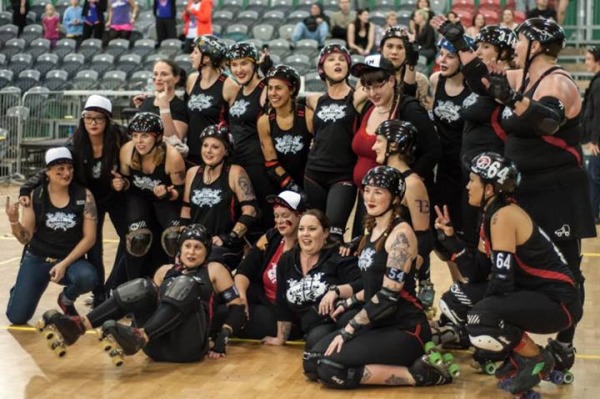
Photo by Rien Croonenborghs
What city are you based in?
Auckland, New Zealand
Why is Auckland nicknamed “Pirate City”? How has your league played with the pirate theme?
New Zealand is a pretty sail-mad country – it’s one of our biggest industries, and we’re also pretty good at it (this year’s America’s Cup excluded, cough). Auckland is often called the “City of Sails” because of just how much we’re surrounded by harbours and the ocean. Really, as ocean lovers, we couldn’t be called anything else.
Congratulations on your recent graduation to full WFTDA membership! Pirate City is WFTDA's first member league in New Zealand. Wow! What made you decide to join the WFTDA? And what have been some benefits and challenges of the process?
Thank you! Striving to become a WFTDA league was a natural progression for us. One of the biggest challenges is finding other WFTDA leagues to play against. There are no other WFTDA leagues in New Zealand, so no matter what, we have to play internationally to fill our quota. With only two WFTDA leagues in Australia, it can be tough to find a team that’s even available to play us. We ended up flying to Hawaii in July of this year in our bid to gain full member status. It was skating against the unknown for us; we had no idea how we’d go against an American team. We won against Pacific Roller Derby (252-58), which was a pleasant surprise for us, and a nice feeling to know that our hard work paid off.
Pirate City has long been a pioneer organization for roller derby in New Zealand. As a WFTDA member league, how will you continue to encourage and foster roller derby in New Zealand?
As skaters, we attend as many invitational games as we can throughout the country, where we always bring a bit of Pirate sass against the teams we play. Skaters from nearby leagues are always welcome to join in any of our trainings. As coaches, we attend as many boot camps as possible, and it’s always an honour when we’re asked to help run them, so we try not to turn many down.
How does your season run?
Typically from late January to early December. There’s about two months on either side when we’re winding down from, or gearing toward, our home season, which involves two round-robins with our three home teams. Our travel season runs concurrently, and it lasts longer than our home season. We have a wee break in the middle of the year for about a month, but even then our coaches taking care of fresh meat or running boot camps while our league goes for outdoor skates along the waterfront. We’re fairly busy, but we love it.
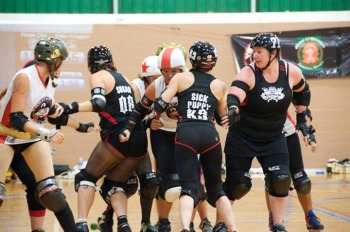
Photo by Curtis Craft
What are the closest WFTDA leagues to you?
Victorian Roller Derby League in Melbourne and the Sun State Roller Girls in Brisbane. Both are in Australia. Hopefully we’ll have other WFTDA leagues in New Zealand soon – Richter City Roller Derby in Wellington and another league in Auckland (Auckland Roller Derby) are both going through the WFTDA Apprentice Program at the moment.
How many skaters/teams do you have?
Our skater numbers vary throughout the year as people drop off or new skaters come through, but we operate with roughly 40 skaters. We have three home teams: Mascara Massacre, the Blackheart Bruisers, and Dead Wreckoning. We have one travel team: the All Scars.
How is your league structured (home teams, travel team, management)?
Management-wise, our Board of Trustees governs our various committees (media, sponsorship, bout, etc) and acts as an executive vote on certain decisions. Our coaches are all active skaters who happen to be on both a home team and the All Scars. The coaching committee has a good mix of veteran skaters (four-to-five-plus years of experience) and newer talent, which is good when it comes to offering up a different perspective on drills and strategy to teach the league.
Please tell us about the “Black Dahlia Cup.” What makes Black Dahlia so special to your league?
The Black Dahlia cup is the home season championship game, and it is named for the skater who kicked off roller derby in New Zealand in 2006. She was a founding member of the Pirates, and who knows how roller derby would have begun in New Zealand if it wasn’t for her. There is no one else we could have named our championship cup after.
Who is your biggest rival? And have you had any outstanding, memorable moments against them when you played them?
We face tough competition in Richter City Roller Derby from Wellington. Before the start of this year, the All Scars had an unbeaten record in New Zealand. But for the All Scars’ first game of the season against Richter City, we lost by two points. That loss hurt, but we came away from it knowing what we needed to work on and how we could be a better team. That brings us to the National Tournament in October, and our other main rival, the Auckland Roller Derby League (ARDL). A few skaters left the Pirates in 2011 to set up ARDL, and although we skate in the same city, we had never played against each other. ARDL did great in their first year, taking out the 2012 National Tournament (which the Pirates didn’t attend) with an undefeated record throughout the country. When it came to the semi-finals of the Tournament this year, the match-ups worked out differently than we’d expected, and ARDL faced Richter City for a spot to play us in the final. ARDL won their game against Richter City, setting up a bit of a showdown for the final. We won 279-120, and we felt pretty darn proud.
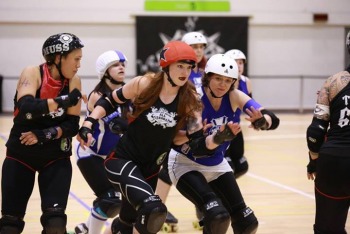
Photo by James Yang Photography
What are the individual challenges of your city?
Our biggest challenge in Auckland is having another league in the city, but despite that we do well attracting fans. Still, audience sizes are small compared to other countries – a crowd of 1,000 to 1,500 is considered a “good” bout for any of the big leagues. New Zealand’s population as a whole is pretty small (4.5 million). Otherwise, Auckland is a fantastic city to live and train in! We’ve got great waterfront concrete for skating, a good relationship with our training area (a multi-sport arena that also hosts concerts), and a committed core of derby fanatics. We love showing visitors to Auckland around, and of course any international skater is always welcome to come and practice with us.
What are the challenges of your country? How can the derby-verse contribute to the growth of roller derby in New Zealand?
Our biggest problem is our geographic isolation. We're mostly starved of the big-name bootcamps that tend to be held in the Northern Hemisphere, or even Australia. Whenever a big-name skater comes to a camp here, tickets sell out fast. It'd be great to have more bootcamps - we really only have one big one (the Low Down Derby Throw-Down) for the entire country once a year. So consider this a call-out for any international leagues or skaters who want to hold a camp in New Zealand! We'd be very grateful.
What are your biggest training challenges?
The main part is keeping everyone interested and engaged at the right level. We're not a big enough league to have a separate Rec league, so when fresh meat join in on scrimmaging and training with the league, our coaches have to teach skills that challenge our better skaters but aren't out of reach for our newer ones. We're always watching international bouts to keep up-to-date with international play so that we don't fall behind. Our fresh meat courses run at the same time as our All Scars practices, and because all of our coaches are travel team skaters, it's a juggle making sure they don't miss too many practices because they're coaching.
How many days a week do you practice? How are your practices divided/organized among your teams/skaters?
We hold three league trainings each week that run for two hours each time. We go over basic roller derby strategy and moves, as well as everyone’s favourite: scrimmage night! The league usually splits up into home teams for scrimmage, and each team will hold whatever extra trainings they want (which they organise themselves). The All Scars train an extra hour on top of the two league trainings that aren’t scrimmage, as well as any other extra trainings during the lead up to tournaments or big games. As everyone in the derby community already knows, roller derby is a huge commitment.
Who are some “behind the scenes” skaters/members who really help your league run?
It’s not so much behind the scenes members, but what our members do behind the scenes. We’ve got a pretty dedicated bunch of volunteers, without whom we’d struggle to survive. Our head NSO, Bruise N’Bury Her, commits so much time to making sure the stats are correct, helping to run the WFTDA side of things for the league, and attending every single training. It’s incredible how much work she does for our league, and a lot of it is thankless. One of our referees, Fury Godmutha, and one of the league’s stalwarts, Big Mack, don’t live in Auckland. They live in Whangarei in Northland, which is about a four-hour return trip away. But the pair of them travel to Auckland every week for training and never complain about the drive, which is just incredible.
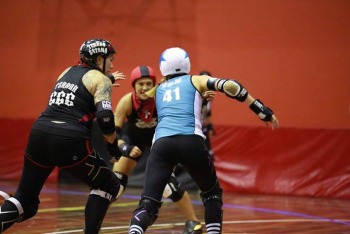
Photo by Rien Croonenborghs
Who are some of your star skaters on the track, and why?
A lot of our best skaters are the ones who’ve been around the longest. The Pirates have a reputation for hard hits, and a lot of that is due to our league stalwart, Terror Satana. She’s been involved in roller derby almost since it was introduced in New Zealand, and she’s most likely the hardest, cleanest-hitting player in the country. Her sister, Skate the Muss, also has a reputation as a hard-hitter, and it’s fair to say no one else hits as aggressively as she does. Fia Fasi Oe?, which means “do you wanna fight” in Samoan, is an incredible jammer. She spent many years competing nationally as a figure skater, and it’s not uncommon to see her spin out of a pack or slice her way through any hole. She was also recently chosen as a selector for the 2014 Team New Zealand. All three players, as well as seven other Pirates, made the Team NZ that competed at the 2011 Roller Derby World Cup, where Skate the Muss was also awarded team MVP. Training against the best means talented newcomers develop much faster, and we’re already starting to notice that with skaters only into their second season. Lady Trample’s become a star jammer for the All Scars and is making a name for herself as a clean, strong jammer who’s always smiling in photos. TutanKarnage is the glue that sticks packs together on the track, with great game knowledge and hits that drive jammers off the track. Machete Confetti, Kid Vicious, Sick Puppy, Myrtle Kombat, Coup D'eTalia, and Sugar Hit are all names to watch as well.
Do you have any big bouts coming up that you’re really looking forward to? Why?
In February, Auckland will hold its Pride Festival for the LGBT community. We’re hosting a charity bout for a local organisation called Rainbow Youth and playing against Vagine Regime Aotearoa. A lot of skaters are really excited for that one. Travel wise, there’s The Great Southern Slam (TGSS) in Adelaide, plus a number of national and international games in the works, AND the Blood & Thunder Roller Derby World Cup of course! 2014 is going to be a big year.
A number of skaters and coaches from Pirate City travelled to Toronto in 2011 to represent New Zealand at the Roller Derby World Cup. Team New Zealand made quite an impression on the derby-verse with the performance of a Maori “haka.” Please tell us what a haka is, and what it means to your league?
A haka is a Maori war dance that has a lot of spiritual meaning for people, regardless of whether they’re Maori or not. The most famous haka is Ka Mate (pronounced car mar-teh, for those who are curious), which became more popular the more often the All Blacks performed it. (Never heard of the All Blacks? They’re New Zealand’s national rugby team. Rugby to New Zealand is the equivalent of what hockey means to Canadians). When fans perform a haka it’s as a sign of support for their team. It’s an honour and a respect to receive one, as well as to perform one. The haka that Team New Zealand performed at the World Cup meant a great deal to the skaters. A lot of them were either Maori or grew up knowing the importance of a haka, and it rarks you up (i.e., gets you excited) to no end! Stomping your feet, shouting a challenge at your opponents in your country’s native language…there’s a real sense of pride in performing a haka. Considering the work and commitment it took for the NZ skaters to make it to the World Cup, a haka seemed like the most logical expression of that pride. Who knows, maybe Team NZ 2014 will perform one too!
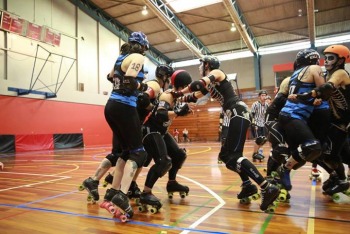
Photo by James Yang Photography
How does your league give back to the community?
Recently we held a fun charity bout for Movember (the charity cause for men's health in November, where men sprout moustaches and call for donations), and we've got another one coming up for Rainbow Youth early next year. Often our skaters will be asked to come along to a public event and do a bit of promotion on skates, which we're happy to do because it gives us a chance to talk about roller derby to people who otherwise normally have never heard of it.
Who are some of your favorite sponsors?
Justin Lopes from Back to Your Feet Physiotherapy is our ultimate supporter. We’re lucky that Justin is a fantastic sponsor who truly loves roller derby (he recently even changed his company’s logo to a roller derby skater silhouette!). We’re truly thankful for all of his support.
Do you have a special message for your fans?
We love our fans and the New Zealand roller derby community! We’re spread fairly far apart geographically, but it’s always the best time when we get together at games and events.
Would your league like to be the WFTDA Featured League of the month? Have you had an extraordinarily successful season that you'd like to share with the wftda.com fans? If you are a full WFTDA member league and have the authorization to speak on behalf of your league, we'd love to hear from you! Or nominate your favorite league and tell us why they should be featured on wftda.com! Please contact webmaster@wftda.com.
Real. Strong. Athletic. Revolutionary.